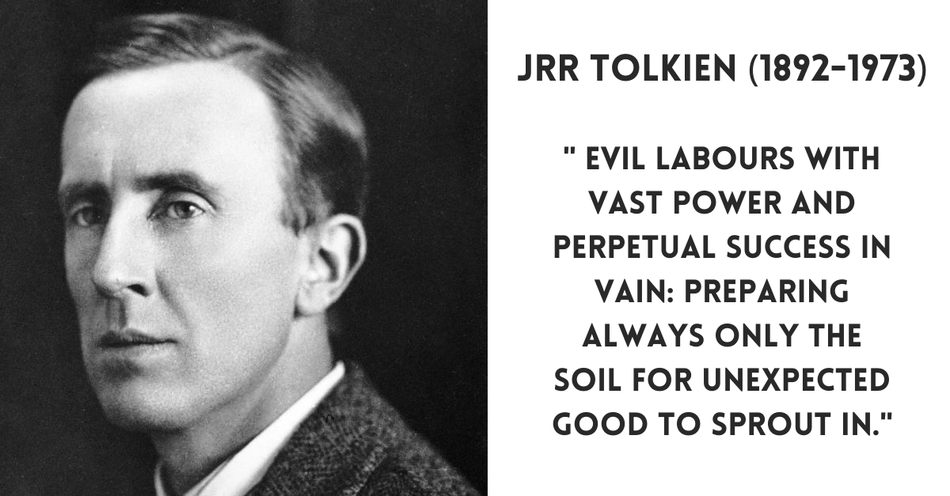John Ronald Reuel Tolkien (1892-1973), better known to us as J.R.R. Tolkien, penned two of the best-selling fiction works of all time. The Hobbit (published in 1937) ranks at number five and has sold 150 million+ copies, and The Lord of the Rings (published in 1954) is number three, also having sold over 150 million copies (both rankings were compiled in 2020). In many instances, J.R.R. Tolkien’s and his fiction’s fans may be defined as fanatics (some will admit this). Numerous fan clubs and websites propagate J.R.R. Tolkien’s popularity and novels and stories. The fascination with his books has spilled over into captivation with the author—his life, influences, and method of imaginings.
Born in January 1892 in South Africa, his mother took three-year-old “Ronald” and his younger brother to England on a family visit. They remained near Birmingham after his father died unexpectantly in South Africa during their absence. A bright student, Tolkien loved languages and studied French, German, Latin, Greek, and displayed a penchant for Old English, Middle English, and Gothic. He graduated from Exeter College school in 1915 with first-class honors.
Tolkien married Edith Bratt when he was twenty-one and enlisted in the British military. Discharged in 1920, he embarked upon his career at Oxford, finding employment as a lexicographer for the Oxford English Dictionary. Tolkien spent the remainder of his life in the environs of Oxford, a career and life that included many interesting moments.
10 Important Events in J.R.R. Tolkien’s Life
1. In 1904, when Tolkien was 12, his mother died from diabetes complications. He and his brother came under the guardianship of Father Francis Morgan, a Roman Catholic priest. Father Morgan loved the Tolkien boys and helped them financially for the remainder of his days. Tolkien professed faith as a Roman Catholic.
2. In 1916, Tolkien married Edith Bratt. The marriage flourished for fifty-five years until Edith’s death in 1971. He died in 1973, and they are buried alongside each other on the Oxford grounds.
3. From July to November 1916, Tolkien served in the Battle of the Somme. On the first day alone, British forces experienced more than 19,000 deaths. Tolkien suffered trench fever, and it affected him deeply for years. He grieved the loss of many friends in WWI. Later, he would write to his son Christopher, serving in WWII, “The utter stupid waste of war, not only material but moral and spiritual, is so staggering to those who have to endure it.”
4. In 1925, J.R.R. Tolkien was elected to Rawlinson and Bosworth Professor of Anglo-Saxon at Oxford and Fellow at Pembroke College (Oxford).
5. In 1926, Tolkien met C.S. Lewis when they were English faculty colleagues at Oxford.
6. In 1933, Tolkien and Lewis re-founded (as it were) a student library club called the Inklings. It lasted until 1949, with members including children’s Roger Lancelyn, novelist Charles Williams, Lewis’s brother Warnie, and Tolkien’s son Christopher.
7. In 1935, Tolkien’s “second father,” Father Francis Morgan, died.
8. In 1937, The Hobbit was published.
9. In 1954, The Lord of the Rings was published.
10. In 1977, four years after his father’s death, Christopher Tolkien published The Silmarillion. Tolkien was reworking various drafts of the book when he died, so Christopher edited the book from various versions (including some notes going back to WWI) and was credited as co-author.
10 Important Quotes by J.R.R. Tolkien
When one searches for "J.R.R. Tolkien quotes," most of the ones on informational sites come from his fiction. Following are 10 quotes from the man himself. They speak to the gentleman behind the writings.
1. Tolkien may not have invented fantasy, but he took the genre to another level with The Hobbit and The Lord of the Rings. He said, “Fantasy is escapist, and that is its glory. If a soldier is imprisoned by the enemy, don’t we consider it his duty to escape?… If we value the freedom of mind and soul, if we’re partisans of liberty, then it’s our plain duty to escape, and to take as many people with us as we can!”
2. “A friend of mine tells (me) that I talk in shorthand and then smudge it.”
3. “The proper study of Man is anything but Man; and the most improper job of any man, even saints (who at any rate were at least unwilling to take it on), is bossing other men. Not one in a million is fit for it, and least of all those who seek the opportunity.”
4. “A pen is to me (is) as a beak is to a hen.”
5. “The Lord of the Rings is of course a fundamentally religious and Catholic work; unconsciously so at first, but consciously in the revision. That is why I have not put in, or have cut out, practically all references to anything like ‘religion,’ to cults or practices, in the imaginary world. For the religious element is absorbed into the story and the symbolism.”
6. “Of course God is in The Lord of the Rings. The period was pre-Christian, but it was a monotheistic world.”
7. In his response to Stanley Unwin, his publisher who rejected The Silmarillion for publication, Tolkien said, “Mr. Baggins began as a comic tale among conventional and inconsistent Grimm’s fairy-tale dwarves, and got drawn into the edge of it - so that even Sauron the terrible peeped over the edge. And what more can hobbits do?”
8. From a letter to his son, Michael: “My own history is so exceptional, so wrong and imprudent in nearly every point that it makes it difficult to counsel prudence. Yet hard cases make bad law; and exceptional cases are not always good guides for others.”
9. This 1944 letter to his son Christopher who was serving in World War II is a long one, but provides a strong look at Tolkien’s heart:
“If anguish were visible, almost the whole of this benighted planet would be enveloped in a dense dark vapour, shrouded from the amazed vision of the heavens! And the products of it all will be mainly evil - historically considered. But the historical version is, of course, not the only one. All things and deeds have a value in themselves, apart from their ‘causes’ and ‘effects.’ No man can estimate what is really happening at the present sub specie aeternitatis. All we do know, and that to a large extent by direct experience, is that evil labours with vast power and perpetual success in vain: preparing always only the soil for unexpected good to sprout in. So it is in general, and so it is better for us, even on the temporal plane, in the mercy of God. And though we need all our natural human courage and guts (the vast sum of human courage and endurance is stupendous, isn’t it?) and all our religious faith to face the evil that may befall us (as it befalls others, if God wills) still we may pray and hope.”
10. Answering a reader who thanked him for The Lord of the Rings (which Tolkien refers to as The L.R.): “Of course The L.R. does not belong to me. It has been brought forth and must now go its appointed way in the world, though naturally I take a deep interest in its fortunes, as a parent would of a child. I am comforted to know that it has good friends to defend it against the malice of its enemies. (But all the fools are not in the other camp.)”
10 Things You Should Know about J.R.R. Tolkien
1. Tolkien created the term “glossopoeia,” which refers to creating a language for artistic purposes. Between 1909 and 1915, he invented languages included in Nevrosh, Book of Foxrook, and Qenya (all penned by him).
2. J.R.R. Tolkien made up stories for his four children, and one brought us The Hobbit, which had Tolkien’s illustrations (including the maps and dust jacket design) in the first edition.
3. The Lord of the Rings took the author twelve years to complete, and he called it “a monster—an immensely long, complex, rather bitter, and very terrifying romance, quite unfit for children.”
4. After thirty-four years as a professor at Oxford, Tolkien retired in 1959, yet chose to inhabit its environment for the rest of his life.
5. Neither Tolkien nor Lewis drove or owned automobiles, thereby avoiding modern-day societal norms. Their lives intertwined in both losing their parents and having served in the military.
6. In such a solidly academic setting as Oxford, Tolkien suffered mocking from some academy contemporaries about his novels, who said, “How is your hobbit?”
7. Tolkien made a reasonable amount of earnings from the sale of The Hobbit and The Lord of the Rings. But the current worth of his estate eclipses the astounding amount of $500 million.
8. Scholars argue the Inklings impacted each other’s work in many ways, but Tolkien was reluctant to say how much they influenced each other. In a 1966 letter to Roger Verhulst, Tolkien said, “Charles Williams’ connection with the Inklings was in fact an astronomical accident that had no effect on his work, and probably no effect on any of the other members except Lewis. Certainly none on me.”
9. Tolkien and Lewis disagreed on some things, including the Narnia series and some religious matters. However, this did not affect their friendship, which was open and, for the most part, warm.
10. Tolkien was a skillful artist, often drawing vision from his writings for his paintings.
Indeed, J.R.R. Tolkien left us with imaginative creations that continue to encourage and fascinate readers of all ages. His story is one of tragedy and triumph. For us as Christians, it’s edifying to realize his strong faith had such an influence on his life and his novels and stories.
Further Reading:
Who Were the Inklings Besides C.S. Lewis and J.R.R. Tolkien?
Why Was Charles Williams the Odd Inkling?
Last of the Inklings' Thursday Meetings
The Enduring Legacy of C.S. Lewis
Photo Credit: Public Domain via Wikimedia Commons/Quote Graphic by G. Connor Salter

Lisa Loraine Baker is the multiple award-winning author of Someplace to be Somebody. She writes fiction and nonfiction. In addition to writing for the Salem Web Network, Lisa serves as a Word Weavers’ mentor and is part of a critique group. She also is a member of BRRC. Lisa and her husband, Stephen, a pastor, live in a small Ohio village with their crazy cat, Lewis.
This article is part of our People of Christianity catalog that features the stories, meaning, and significance of well-known people from the Bible and history. Here are some of the most popular articles for knowing important figures in Christianity:
How Did the Apostle Paul Die?
Who are the Nicolaitans in Revelation?
Who Was Deborah in the Bible?
Who Was Moses in the Bible?
King Solomon's Story in the Bible
Who Was Lot's Wife in the Bible?
Who Was Jezebel in the Bible?
Who Was the Prodigal Son?









